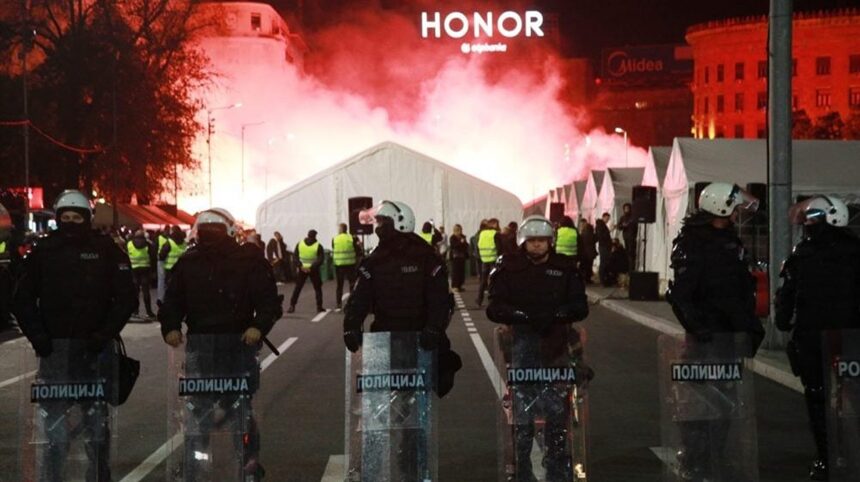The ongoing tent settlement—widely referred to as Ćaciland—in front of the Serbian Parliament remains one of the most visible symbols of the political decay under President Aleksandar Vučić. While the European Union has certain leverage over Serbia, analysts agree that the EU alone cannot dismantle what many describe as a paramilitary-style encampment maintained to protect Vučić’s grip on power.
What is clear, they say, is that the camp will likely remain in place at least until the next elections, serving the regime’s interests rather than public order.
A Tactical Delay: Vučić Buying Time With Brussels
Marija Stojanović of Savremena Politika and EWB says that while Brussels can push Vučić to act, the Serbian president has built his entire political strategy on stalling, manipulating, and selectively appeasing the EU.
“He is buying time,” she says, adding that Vučić is waiting to see whether the EU will open Cluster 3 in December and how the NiS–Russia situation unfolds.
“If the Cluster opens, maybe Ćaciland will take cover, but for now that seems unlikely.”
According to her, the encampment is simply too politically useful for Vučić to dismantle voluntarily. Every tent reinforces the narrative of a besieged regime that must be “defended” at all costs—ironically, a crisis manufactured by the regime itself.
Ćaciland: A Tool of Intimidation in the Heart of Belgrade
Dragan Popović, director of the Center for Practical Politics, is blunt: the EU’s influence is limited not because Brussels lacks leverage, but because Vučić has built a system where institutions and public spaces serve his political survival, not democratic governance.
“Ćaciland is the clearest example of the regime’s tactics,” he says.
According to him, the camp plays multiple roles:
- Physical control of the symbolically important area around the Assembly
- A recruitment base for regime-loyal enforcers
- A stage for orchestrated intimidation and harassment, including recent abuse of a mother on hunger strike
Popović argues that while the EU may condemn these acts, it cannot single-handedly dismantle a structure that the regime uses as a shield for its authoritarian practices
Kozma: “Vučić’s Regime Cares Only About Power and Money”
Green-Left Front MP Robert Kozma goes further, accusing the ruling structure of operating as a criminal organization entrenched in state institutions.
“The only thing Vučić’s regime cares about is staying in power so they can continue to funnel state money into private pockets,” Kozma says.
He lists the regime’s abuses:
- destruction of independent institutions
- repeated electoral theft
- criminalization of police and security sectors
- repression and violence against students and peaceful citizens
- humiliation and torture of a mother forced into a hunger strike
According to Kozma, Serbia’s financial situation is deteriorating rapidly, with investment halting and companies shutting down in recent months. He argues that the government is desperate for funds from the EU’s Reform and Development Instrument.
“If the EU conditioned the next tranche on dismantling the criminal Ćaciland, the regime might bend—because personal enrichment is their only priority.”
Kozma also mocked the regime’s attempt to hide the encampment from EU Ambassador Andreas von Beckerath, calling it “a circus of fake hunger strikers and paid agitators funded by Serbian taxpayers.”
All experts agree on one point: the EU can pressure, but citizens must deliver the final blow to Vučić’s authoritarian theatrics.
Kozma stresses that the struggle for democracy in Serbia “must be led by the citizens themselves,” as the regime will not voluntarily dismantle the structures that sustain its power.
He calls for opposition coordination and a unified front to force elections and challenge the system that has enabled the existence of paramilitary-style intimidation zones like Ćaciland.







